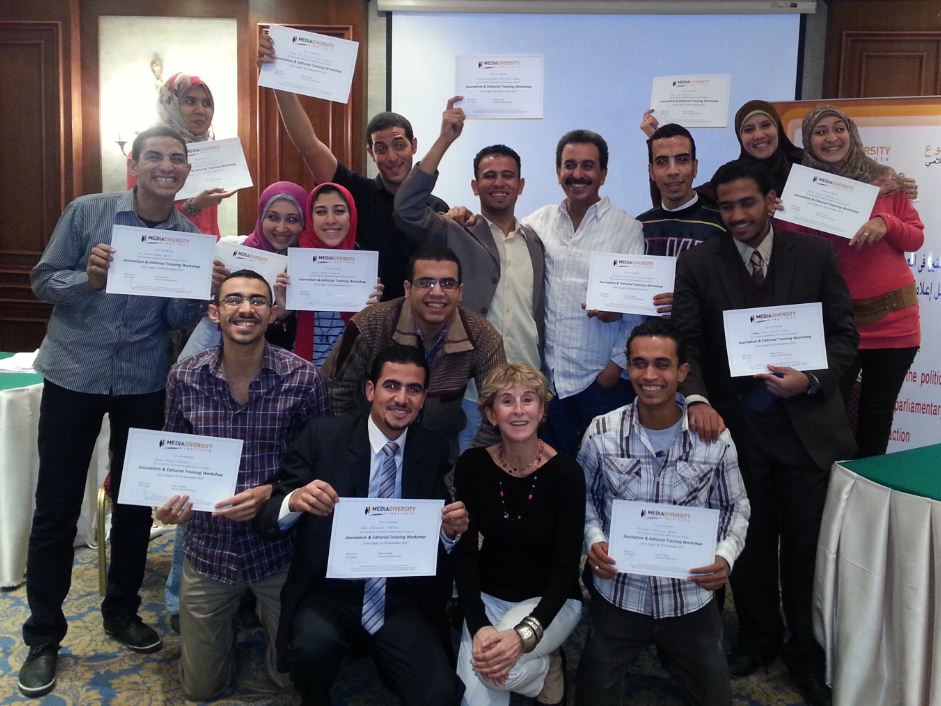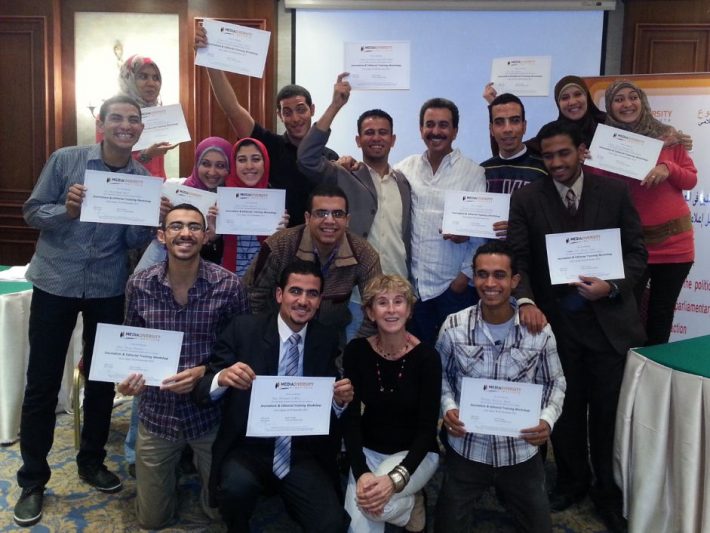Published: 8 March 2013
Country: Egypt
By Milica Pesic

 With the support of the Media Diversity Institute, Egyptian journalism students produced a website covering political issues. The website is named “Ahna Keda” – The Way We Are – (www.a7nakeda.com) and it expresses the need for citizens to be heard and seen by the media regardless of their political, social and cultural background.
With the support of the Media Diversity Institute, Egyptian journalism students produced a website covering political issues. The website is named “Ahna Keda” – The Way We Are – (www.a7nakeda.com) and it expresses the need for citizens to be heard and seen by the media regardless of their political, social and cultural background.
Fifteen journalism students from six Egyptian universities are responsible for writing articles for the website, as well as for editing of the content and management of all aspects of the site.
During a 5-day workshop in Cairo between 26 – 30 November 2012, the 15 students were trained in the concept of Inclusive Journalism, the principles of critical non-partisan and unbiased political reporting. They were also trained to understand journalism’s role in facilitating debate and citizen engagement with politics.
Helped by MDI trainers, the students looked at the issues supposed to be discussed in parliament, the importance of inclusive reporting and the challenges political journalists face when questioning the powerful or giving a voice to the powerless.
The students worked with experienced reporters, Egyptian and British, and received presentations from an expert on parliamentarian procedures, a political correspondent specialised in reporting on parliament and a social media expert as well as a web developer.
 The website is made by and targeted at young people. In order to build its audience, the webzine team utilizes the connections that MDI and its partners have with young activists and youth civil society.
The website is made by and targeted at young people. In order to build its audience, the webzine team utilizes the connections that MDI and its partners have with young activists and youth civil society.
Other students and young from across Egypt are encouraged to contribute to the website “Ahna Keda”.
At the training workshop the students expressed the need to learn the best way to provide visuals for their stories via a photo-journalism course. They also expressed a wish to visit the UK to understand better the British media’s commitment to diversity as well as to meet their peers who run similar websites in order to exchange experience and stories.
Egyptian journalism students were selected via a competition, organised in cooperation with their tutors, to form the editorial and management team responsible for the website. The students come from the following universities across Egypt: Cairo, Al Azhar, Helwan, Pharos, Sohag, and Al Minya.
The training course and the support of the website are part of the project “Inclusive Parliament: Building citizens’ participation in the political process in Egypt through better media, parliamentary and civil society interaction”, funded by the UK Embassy in Cairo. It is one of many other activities, including training for journalists, roundtable discussion and TV programmes, that will be organised during the life of the project.
British Embassy in Cairo have conducted and published an interview with one of the students from MDI workshop, Heba Al Gazar.
 Heba Al Gazar, 20 years.
Heba Al Gazar, 20 years.
Studies: Second year student. Media and Communication. Alexandria University.
How did you hear about the programme?
It was a fair competition at the university. We had to write a report to be evaluated by two professors in order to join the two years programme. I was lucky to win this opportunity out of 60 potential candidates.
Describe your university, Alexandria University.
I like how the Media and Journalism school is small and has a relaxed atmosphere. It is easy to get to know people; there are only 60 students in the programme so you get to know the others quite well. The staff and the teachers are also very helpful.
Why did you choose Journalism as a major?
I love to write and to express my own and the nation’s thoughts, hopes and worries.
What do you like best about the MDI programme?
I love the idea of getting real life experience while I am completing my Bachelor degree. I consider myself lucky to learn about journalism from real well known journalists and to know how things are done in the west and the UK in particular.
Are you satisfied with the programme?
There are two sides to this. I am happy with the research, the theoretical perspective and the training, but I am afraid the problem is that it is hard to find a job later on. If you choose an education like this you have to think ahead, to plan and maybe try to get a few placements.
What do you want to work with in the future?
I want to be a famous columnist.
Who is your favorite columnist?
Anees Mansour
Who is your favourite blogger in Egypt?
Nawra Negam. I consider her as a model for the new female generation.
Who is your favorite talk show star?
Oprah Winfrey
The programme is in Arabic, would you prefer if it done in English?
I like idea that it’s delivered in Arabic as at the end we are going to report in Arabic. I also like that professional terms are delivered in Arabic and in English. I tend to think that it’s very difficult to be a famous journalist writing in a foreign language.
What are your dreams?
I dream of balanced free Egyptian media covering different issues of youth and elders, men and women, cities and urban, Muslim and Christians. Everybody should have a fair share in media.
Do you have any advice for future students?
My advice to them is to follow their passion. Egypt needs professional in all fields. I was a student at faculty of pharmacy, and then I decided to leave and to follow my dream in Journalism. It was not an easy decision especially for my parents. My advice for future students is be yourself, follows your passion and make sure it suits you.
*interview with Heba Al Gazar for UK Embassy in Cairo.
For more information on MDI and MDI workshop, contact:
